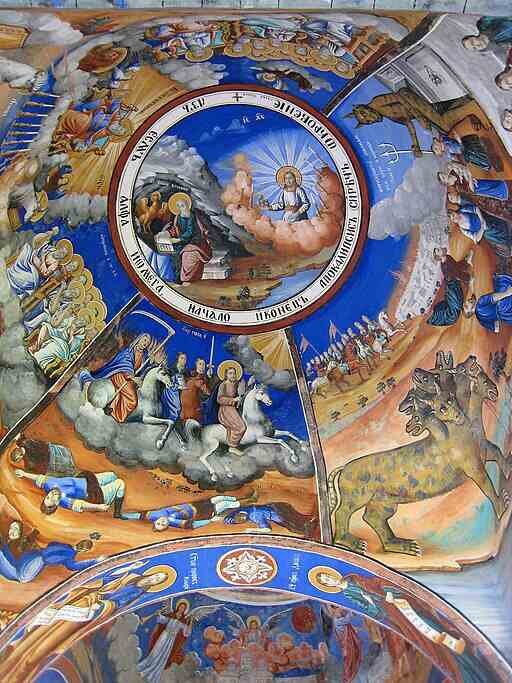Te Deum laudámus: te Dominum confitémur.
Te ætérnum Patrem omnis terra venerátur.
Tibi omnes Angeli; tibi cæli et univérsae potestátes.
Tibi Chérubim et Séraphim incessábili voce proclámant:
Sanctus, Sanctus, Sanctus, Dóminus Deus Sábaoth.
Pleni sunt cæli et terra majestátis glóriæ tuæ.
Te gloriósus Apostolórum chorus;
Te Prophetárum laudábilis númerus;
Te Mártyrum candidátus laudat exércitus.
Te per orbem terrárum sancta confitétur Ecclésia:
Patrem imménsæ majestátis;
Venerándum tuum verum et únicum Fílium;
Sanctum quoque Paráclitum Spíritum.
Tu Rex glóriæ, Christe.
Tu Patris sempitérnus es Fílius.
Tu ad liberándum susceptúrus hóminem, non horruísti Vírginis úterum.
Tu, devícto mortis acúleo,
aperuísti credéntibus regna cælórum.
Tu ad déxteram Dei sedes, in glória Patris.
Judex créderis esse ventúrus.
Te ergo quǽsumus, tuis fámulis súbveni,
quos pretióso sánguine redemísti.
Ætérna fac cum sanctis tuis in glória numerári.
[added later, mainly from Psalm verses:]
Salvum fac pópulum tuum, Dómine, et bénedic hæreditáti tuæ.
Et rege eos, et extólle illos usque in ætérnum.
Per síngulos dies benedícimus te.
Et laudámus nomen tuum in sǽculum, et in sǽculum sǽculi.
Dignáre, Dómine, die isto sine peccáto nos custodíre.
Miserére nostri, Dómine, miserére nostri.
Fiat misericórdia tua, Dómine, super nos, quemádmodum sperávimus in te.
In te, Dómine, sperávi: non confúndar in ætérnum.
|
We praise thee, O God : we acknowledge thee to be the Lord.
All the earth doth worship thee : the Father everlasting.
To thee all Angels cry aloud : the Heavens, and all the Powers therein.
To thee Cherubin and Seraphin : continually do cry,
Holy, Holy, Holy : Lord God of Sabaoth;
Heaven and earth are full of the Majesty : of thy glory.
The glorious company of the Apostles : praise thee.
The goodly fellowship of the Prophets : praise thee.
The noble army of Martyrs : praise thee.
The holy Church throughout all the world : doth acknowledge thee;
The Father : of an infinite Majesty;
Thine honourable, true : and only Son;
Also the Holy Ghost : the Comforter.
Thou art the King of Glory : O Christ.
Thou art the everlasting Son : of the Father.
When thou tookest upon thee to deliver man : thou didst not abhor the Virgin’s womb.
When thou hadst overcome the sharpness of death :
thou didst open the Kingdom of Heaven to all believers.
Thou sittest at the right hand of God : in the glory of the Father.
We believe that thou shalt come : to be our Judge.
We therefore pray thee, help thy servants :
whom thou hast redeemed with thy precious blood.
Make them to be numbered with thy Saints : in glory everlasting.
[added later, mainly from Psalm verses:]
O Lord, save thy people : and bless thine heritage.
Govern them : and lift them up for ever.
Day by day : we magnify thee;
And we worship thy Name : ever world without end.
Vouchsafe, O Lord : to keep us this day without sin.
O Lord, have mercy upon us : have mercy upon us.
O Lord, let thy mercy lighten upon us : as our trust is in thee.
O Lord, in thee have I trusted : let me never be confounded.
|
O God, we praise you; O Lord, we acclaim you.
Eternal Father, all the earth reveres you.
All the angels, the heavens and the Pow’rs of heaven,
Cherubim and Seraphim cry out to you in endless praise:
Holy, Holy, Holy Lord God of hosts,
heaven and earth are filled with the majesty of your glory.
The glorious choir of Apostles sings to you,
the noble company of prophets praises you,
the white-robed army of martyrs glorifies you,
Holy Church throughout the earth proclaims you,
Father of boundless majesty,
with your true and only Son, worthy of adoration,
and the Holy Spirit, Paraclete.
You, O Christ, are the King of glory,
you are the Father’s everlasting Son;
when you resolved to save the human race,
you did not spurn the Virgin’s womb;
you overcame the sting of death
and opened wide the Kingdom of Heaven
to those who put their faith in you.
You are seated at the right hand of God
in the glory of the Father.
We believe you are the Judge who is to come.
And so we beg you, help your servants,
redeemed by your most precious blood.
Number them among your saints in eternal glory.
[added later, mainly from Psalm verses:]
Save your people, Lord, and bless your inheritance.
Shepherd them and raise them to eternal life.
Day by day, we bless you
and praise your name for endless ages evermore.
Be gracious, Lord, on this day,
and keep us from all sin.
Have mercy on us, O Lord, have mercy.
May your mercy be upon us, Lord,
as we place our trust in you.
In you, O Lord, I rest my hope:
let me never be put to shame.
|


